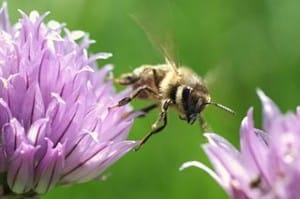Roll Call
by Rep. John Conyers Jr. and Michael Shank
 |
This year, food security is set to suffer another big setback, and the culprit could not be cuter: honeybees. Last winter, America’s beekeeping industry lost nearly half of all its bee colonies. And the numbers keep falling. Last summer, in the largest bee kill on record, more than 50,000 bumblebees were killed in Oregon as a direct result of exposure to an insecticide applied to trees for cosmetic purposes.
The killing has gotten so bad that people are calling it a beepocalypse. This is a serious situation. One-third of the food produced in North America depends on pollination by our honeybees. Nearly 100 varieties of fruits depend on honeybee pollination, from almonds (which are California’s third-largest export) to avocados to apples to cranberries.
If America loses the bees, our country will lose these industries as well, the result of which would be a serious blow to our economic and food security. The annual economic value of pollinators, including honeybees, is $190 billion globally and $20 billion to $30 billion in agricultural production in the United States.
This devastating trend is not unique to the United States, however. Earlier last year, the European Union ratcheted up its emergency response to the dying bee population, suspending for two years the use of neonicotinoids — insecticides initially developed by Shell and Bayer and largely responsible for the beepocalypse — on its agricultural crops.
The EU understands the scientific link between systemic neonicotinoid insecticides and the rapid decline of pollinators and pollinator health. That is no longer the question. It’s now purely a question of political will.
America, then, must act fast if we want to save our bees, our food and our economic productivity.
We are losing honeybee colonies in record numbers, and 2013 set a new record low for honey produced in the United States. Just look at the numbers. Prior to 2006, when insecticide use was less prolific, summer colony losses were hovering at fewer than 5 percent and winter losses were at 17 percent.
Every year since 2006, however, annual colony losses have been averaging 30 percent. And for some veteran beekeepers, it’s wiping out 100 percent of his bee hive operations year after year.
This is not sustainable. At this rate, America will have no honeybee population, and the Department of Agriculture estimates that honeybee colonies survival rates are too low to be able to meet pollination demands of U.S. agriculture crops.
Going forward, saving America’s pollinators must be an immediate priority for us. As Jeff Pettis of the USDA’s Agricultural Research Service Bee Research Laboratory noted in a congressional briefing recently, reducing pesticide use on bee-attractive crops and by homeowners would be a good start.
Additionally, America should also follow Europe’s lead with a two-year ban on these insecticides. (Germany and Italy have banned them for several years already.) Legislation in Congress — introduced by Conyers and Rep. Earl Blumenauer, D-Ore. — would do this very thing, saving our honeybees, our food supply and America’s economic interdependence with these threatened pollinators.
This work at the federal level, combined with efforts such as the Center for Food Safety’s BEE Protective Campaign, might save our pollinators from the beepocalypse — but only if we act now. With bee numbers declining by more than 30 percent every year, every moment matters. Our food and our economy depend on these little bees. Kill them off, and we cut off a critical lifeline. Keep them alive, and we survive.
Rep. John Conyers Jr., D-Mich., is ranking member of the House Judiciary Committee; Michael Shank is associate director for legislative affairs at the Friends Committee on National Legislation.

